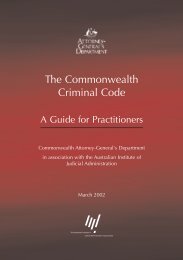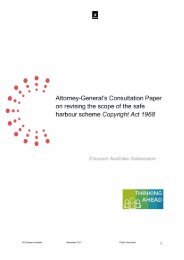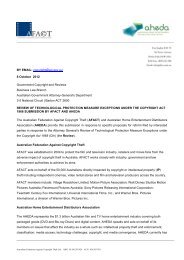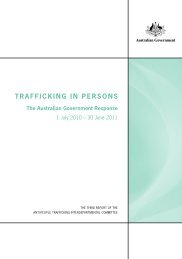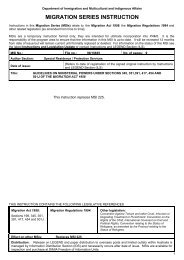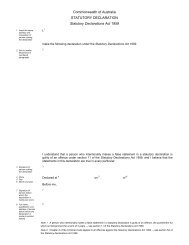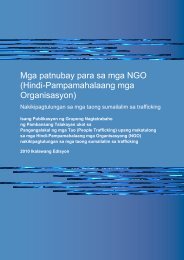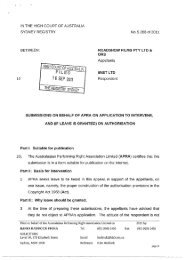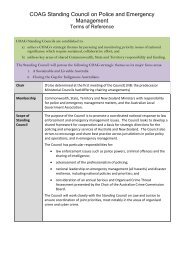Normann Witzleb [PDF 657KB] - Attorney-General's Department
Normann Witzleb [PDF 657KB] - Attorney-General's Department
Normann Witzleb [PDF 657KB] - Attorney-General's Department
You also want an ePaper? Increase the reach of your titles
YUMPU automatically turns print PDFs into web optimized ePapers that Google loves.
the concern that the phrase might be setting the bar too high, it changed its view during<br />
the consultations and accepted it as appropriate in its Final Report. The ALRC<br />
recommends that a plaintiff should only be able to succeed ‘where the defendant’s<br />
conduct is thoroughly inappropriate and the complainant suffers serious harm as a<br />
result’. 14 The VLRC pointed to other areas of law, such as racial and religious vilification,<br />
where liability is likewise limited to more serious cases. 15<br />
13 In contrast to these views, the NSWLRC proposal merely requires that the defendant<br />
invaded the privacy that the plaintiff was reasonably entitled to expect in all the<br />
circumstances having regard to any relevant public interest. 16 The nature of the<br />
defendant’s conduct, including the extent to which a reasonable person would have<br />
regarded the conduct to be ‘offensive’ is one of the factors that the court must take into<br />
account in deciding whether there was such a privacy invasion. 17 The NSWLRC<br />
expressed the view that its draft provision is sufficient to eliminate trivial claims and<br />
also objected on principle to an approach that appears to favour freedom of expression<br />
over privacy. 18<br />
Comment<br />
14 It is common ground that the plaintiff needs to have had a reasonable expectation of<br />
privacy in relation to the matter concerned. This criterion is also accepted in the UK and<br />
in New Zealand. In Campbell v MGN Ltd, both the ‘reasonable expectation’ and the<br />
‘offensiveness’ tests received some support from their Lordships. While Lord Nicholls<br />
regarded a reasonable expectation of privacy as the ‘touchstone’ of whether a fact<br />
concerned the claimant’s private life, Lord Hope and Baroness Hale expressed some<br />
attraction (also) to the ‘offensiveness’ test. 19 Subsequent cases show, however, that the<br />
reasonable expectation test has now become dominant in UK law. 20 In Hosking v<br />
Runting, on the other hand, the New Zealand Court of Appeal favoured the cumulative<br />
application of both criteria to define the cause of action. 21 It is this latter approach that<br />
the ALRC and VLRC recommend to adopt for Australia’s statutory cause of action.<br />
Common Law Right of Privacy under the Human Rights Act’ (2003) 66 Modern Law Review 726, 733-734<br />
(suggesting that the test does not give proper effect to Art. 8 ECHR).<br />
14 ALRC Report, at [74.136].<br />
15 VLRC Report, at [7.142].<br />
16 NSW Draft Bill, cl 74(2).<br />
17 NSW Draft Bill, cl 74(3)(a)(ii).<br />
18 NSWLRC Report, at [5.9]-[5.11].<br />
19 Campbell v MGN Ltd [2004] 2 AC 457; [2004] UKHL 22, [50], see also at [21] (Lord Nicholls), [84] but cf<br />
[92] (Lord Hope), [134]-*136+ (Baroness Hale). For detailed analysis, see Nicole Moreham, ‘Privacy in the<br />
Common Law: A Doctrinal and Theoretical Analysis’ (2005) 121 LQR 628, 630-634, 646-648.<br />
20 Mosley v News Group Newspapers Ltd [2008] EMLR 20, [2008] EWHC 1777 (QB), at [7] (Eady J);<br />
Murray v Express Newspapers Plc and Big Picture (UK) [2008] 3 WLR 1360; [2008] EWCA Civ 446; HRH<br />
Prince of Wales v Associated Newspapers Ltd [2008] Ch 57, [2008] EWCA Civ 1776, at [34].<br />
21 Hosking v Runting [2005] 1 NZLR 1, [2004] NZCA 34, at [117] (Gault P and Blanchard J). Tipping J<br />
intermeshed the two elements suggesting that ‘whether the plaintiff has a reasonable expectation of<br />
privacy depends largely on whether publication … would … cause substantial offence to a reasonable<br />
person’, at [259]; see also at [256].<br />
6


![Normann Witzleb [PDF 657KB] - Attorney-General's Department](https://img.yumpu.com/26247895/6/500x640/normann-witzleb-pdf-657kb-attorney-generals-department.jpg)

